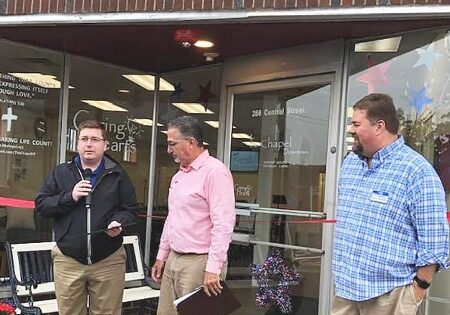Blog Post
Churches Coaching Churches

The two churches denominationally belong to Converge. Shortly after Tom first arrived as Pastor at The Chapel, he invited someone from Converge to help the congregation develop a strategic plan to intentionally pursue certain values and healthy behaviors at the church. Eventually, he also asked Converge to help The Chapel launch their downtown church prototype in Winchendon and Chris was District chairman at the time. That’s when Chris was able to observe firsthand The Chapel’s healthy-church process and he wanted FBC to learn from them.
Chris said, “Jesus modeled coming alongside others, taking the form of a servant, so they could learn from Him. The Chapel became an advocate for us.” He commented that “Tom loves the Church and doesn’t want to see sister congregations hurting because he wants to see Christ glorified. Tom stood with me through a hard season. My church was in their region. The Chapel elders felt like it was their responsibility to help a sister church in need.”
The Chapel elders were excited to be a strategic-planning resource for FBC but proceeded with caution. They understood that there needed to be a “mutual level of commitment by both churches.” With agreement from FBC leadership, The Chapel and FBC wrote a covenant and held a signing ceremony at FBC agreeing to enter a season of ministry collaboration. The covenant made it clear that this wasn’t a takeover and that church-swapping among members wasn’t allowed. Accountability and trust were paramount.
The first step forward was an assessment of FBC and then three-fold support from The Chapel that included:
• Pastoral coaching
• Strategic planning involving The Chapel elders and FBC leadership
• Creating an environment of discipleship among the church members using First Principles to focus on what it means “to be the church”
First Principles discipleship training asks questions and leads people to discover truths in God’s word, initially focusing on the book of Acts. Chris said “it became clear to people that Jesus has a plan and the plan is the church. The book of Acts showed us how to put it all together to make it work.” He saw an attitudinal shift in members to “we instead of me”. There was an increase in trust in the process of being the church and trusting God’s timing for the pace.
FBC has experienced positive measurable outcomes since the strategic plan was approved. The plan addressed areas such as financial challenges, evangelism, and youth ministry. As a result, the church set a goal of increasing their budget 25% over 3- 5 years. Chris taught principles of generosity and people responded. They’ve already passed a funding increase of 30% this year! Local officials informed the church’s food ministry that the church’s kitchen needed to be renovated within five years. FBC creatively completed the work in two years. In addition, they have celebrated 18 baptisms in the past 18 months. And, they now have a 2-year Youth Ministry Intern to work with students and young adults.
Chris has been at the church for 15 years. When he arrived, “the church was a loving church. But through this discipleship process, people have developed a deeper sense that we have enough love to extend ourselves to other people throughout the week. We have enough love from God to persevere in trials. People used to come to church to be loved. Now, they want to love others together! There is hope in redeemed outcomes.”
Chris is encouraged, paying it forward to other local pastors and inviting them into an Overseed revitalization cohort.
Tom is also encouraged. He’s learning what it means to be a patient catalyst as a coach, trusting God’s pace for growth. He remains a regionally minded pastor, learning from others and trusting in the sovereignty of God while also being active in the work. He commented “there are opportunities in front of us for more regional work, collaborating as a network of like-minded churches with a meaningful expression of the Gospel to the region.” And, God knows when the timing is right.
SIGN UP NOW FOR OVERSEED MINISTRY UPDATES
Get updates on resources, ministry needs, opportunities, and news about what God is doing in New England
We are careful with your information. We never sell or misuse your data. You can opt out at any time.
